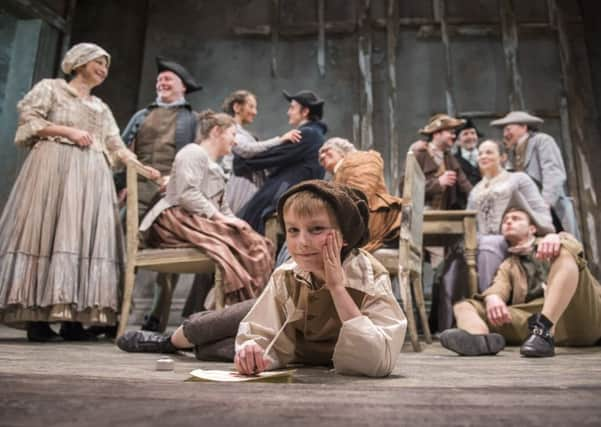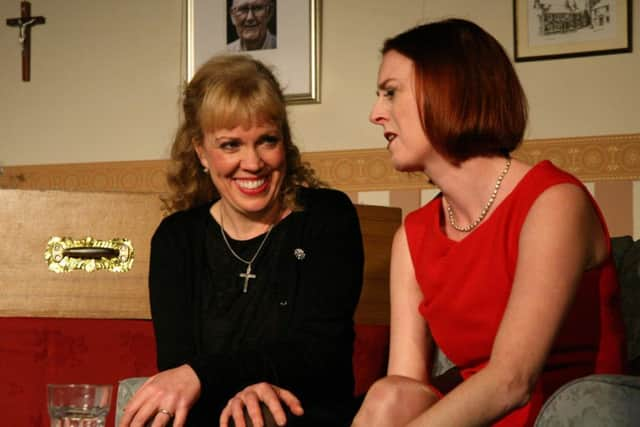Theatre Review: A Tale of Two Cities, House of Bernarda Alba & Hameldaeme


King’s Theatre, Edinburgh ***
Festival Theatre Studio, Edinburgh ***
Oran Mor, Glasgow ****


In this case, the show is the Touring Consortium production of Dickens’ A Tale Of Two Cities, created at the Royal & Derngate in Northampton. Dickens’ novel about a family caught up in the French Revolution certainly expresses a powerful English revulsion against the violence and terror that took hold in Paris after 1789; but Mike Poulton’s broad-brush-stroke adaptation, with a sensational movie-style score by Rachel Portman, takes Dickens’ gift for caricature to extremes and emerges as an undeniably rough-cut parade of stereotypes, from saccharine-sweet heroine Lucy Manette - I heard two women in the interval discussing how much they would like to guillotine her themselves - to the mad French revolutionary Madame Defarge, brandishing dagger, revolver and red knitting in strict rotation.
It has to be said that some of the cast struggle a little with the cartoon-like quality of the show. Joseph Timms exhausts himself in the effort to capture some of the complexity of Sidney Carton, the story’s self-hating anti-hero, but is thwarted by his oddly hipsterish facial hair. Jacob Ifan as Charles Darnay looks marginally more wooden than Mike Britton’s handsome set, and Noa Bodner sexes up the character of Madame Defarge by gazing sultrily at the audience between scenes. Yet the pace is fast and furious, the set good-looking, the story an undoubted thriller, and if the overall effect is more like a patriotic B-list action movie than a stage adaptation of a great classic, it still offers an entertaining night out on an impressive scale, provided you are not in search of subtlety.
Advertisement
Hide AdAt the Festival Theatre Studio, meanwhile, community group Leitheatre this week offered a timely staging of Jo Clifford’s fine version of Federico Garcia Lorca’s The House Of Bernarda Alba, the last play completed by Lorca before he was shot and thrown into a mass grave by Franco’s fascist forces in August 1936.
One of Lorca’s great qualities as a playwright is the intensity with which he understands the link between the personal and the political; and as Franco’s forces reclaimed the country for patriotism, religion and ‘traditional values’, Lorca wrote of personal and sexual freedom, and of the sweet, soaring impulse that always, in the end, rebels against tyrannies like the one imposed by Bernarda Alba on her five adult daughters, all penned up in her house without hope of love, liberty or fulfilment.


The quality of the acting varies greatly in Colin Peter’s production, which sometimes slips over the line between tragedy and comedy. There’s an outstanding performance, though, from Irene Cuthbert as the tyrant Bernarda, reminding us sharply, in this week of all weeks, how some women, robbed of liberty themselves, become the harshest enforcers of patriarchal rules, and mete out the most bitter punishment to other women who try to break the mould.
Lorca’s great play begins with the funeral of Bernarda’s husband; and in truth, there’s no dramatic setting that recurs more often, in European theatre, than the one involving a wake. Yet Damian Mullen’s debut play Hameldaeme, at A Play, A Pie And A Pint, makes a strikingly powerful job of exploring the conflicts that explode between sisters Patricia and Sara, and their mother Kitty, on the night before the funeral of Kitty’s husband, whose coffin in parked in the living-room according to Glasgow-Irish tradition, and whom Kitty addresses as ‘bastard’whenever she is left alone with his bodily remains.
The point is that despite the family pieties surrounding the deceased, there is a backstory of violence, drunkenness and womanising that has left Kitty a complex and embittered character. And with director Jimmy Chisholm stepping brilliantly into the role to replace an illness-hit Barbara Rafferty, and Nicola Auld and Jennifer Hainey acting up a storm as her daughters, Mullen’s script fairly glows with wit and passion; as he seizes one of the oldest subjects in the book, and gives it a fresh and furious twist for new times.
JOYCE McMILLAN